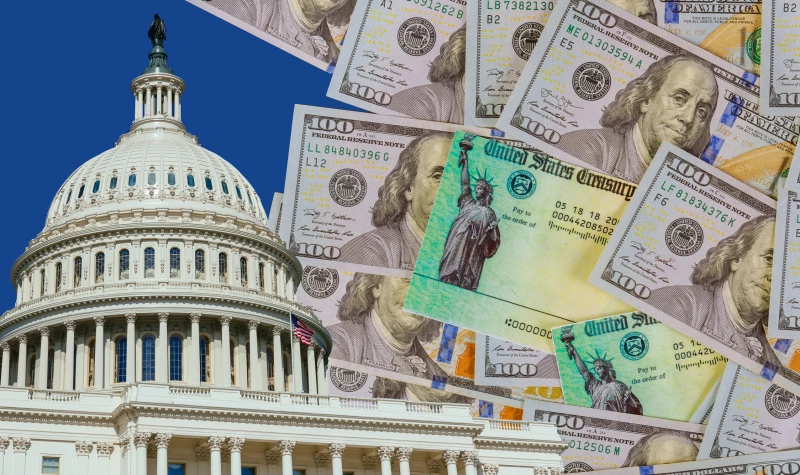As seen in


MAY 17, 2023 06:00 AM
Biden and Congress must address PPP fraud
By David Walker
Last week, House Speaker Kevin McCarthy (R-CA) and congressional leaders from both parties met with President Joe Biden and his economic Cabinet officials in hopes of reaching an agreement to raise the debt ceiling and to begin discussions regarding the fiscal 2024 appropriations process.
Treasury Secretary Janet Yellen recently noted that her department is already taking “extraordinary measures” to prevent a default, which typically includes selling existing government investments and suspending its reinvestments in public sector funds and securities. What has not yet been addressed, however, is the need to stop the failed bipartisan “extraordinary measure” of utilizing high-risk, government-sponsored lending and grant programs to stimulate the economy, which, by emboldening bad actors and creating economic bubbles, has contributed to the current fiscal mess.
HOW THE SUPREME COURT COULD BE FORCED TO WADE INTO BIDEN DEBT CEILING FIGHT
Time and time again, the government has flooded the market with cash with the goal of boosting consumer spending and demand. But this recession mitigation strategy has inflated America’s debt instead and increased cases of fraud while ballooning the frequency of these federal debt ceiling showdowns between the two political branches of government.
The Paycheck Protection Program (PPP) is a recent example of the inherent flaws of Washington’s lax approach to government-sponsored lending and grants. Although the executive and legislative branches were correct in the need to create a system to protect businesses affected by government-mandated COVID-19 closures, they took the program too far and failed to incorporate adequate internal controls to prevent fraud and abuse. Rather than provide targeted relief to small businesses in need, they financially incentivized unproven financial technology companies (fintechs) to write as many loans as possible without regard for accountability or due diligence.
Naturally, a handful of unscrupulous fintechs saw an opportunity and ran with it. According to a December 2022 investigation by the House Select Subcommittee on the Coronavirus Crisis, which issued a staff report titled, “’We Are Not The Fraud Police’: How Fintechs Facilitated Fraud In The Paycheck Protection Program,” two of these so-called fintech companies, Womply and Blueacorn, enabled one in every three PPP loans in 2021. The report found that these two companies approved many of their applications without undertaking full reviews and turned a blind eye to analyzing the data borrowers provided. In the rush to approve as many loans as possible and maximize their profits, the fintechs made “minimal efforts to detect fraud” and forwarded loan applications that contained “obvious fraudulent information.”

In several instances, investigators found PPP applications that contained “[t]ax returns with obvious fraudulent information,” “[applications] with no [t]ax return attached” as required, and even individuals in New Jersey and Minnesota making loan requests for non-existent farms with physical addresses in densely populated cities.
These fintechs served as intermediaries between the Small Business Administration that would fund the loans with taxpayer dollars and the licensed lenders that would write the loans, many of which were eventually and inappropriately forgiven. When the lenders alerted the fintechs and regulators to the rampant fraud they witnessed, the courts ruled they had to approve them or else face penalties under breach of contract laws. The end result? “The biggest fraud in a generation,” according to one attorney general, and more taxpayer-funded debt which has put Congress and the White House on the brink of another high-stakes debt limit negotiation.
This is important to keep in mind as lawmakers continue their talks at the negotiating table. The bipartisan House Problem Solvers Caucus, for example, has proposed a framework to resolve the debt ceiling stalemate, including enacting a statutory Fiscal Sustainability Commission and requiring an annual Government Accountability Office Fiscal State of the Nation Report. These measures are meritorious and would help to shed light on and facilitate tough choices regarding our large and growing fiscal imbalance; however, they will do little to address continuing fraud.

Given that two recessions in less than 15 years have involved several reckless government lending and grant programs, it is important that budget and spending negotiations include increasing transparency and oversight over federal lending and grant activities and holding the fintechs and other bad actors accountable for their fraud. Lawmakers should also work toward clawing back the billions of dollars of taxpayer-funded fees that went to companies that enriched themselves during the pandemic by committing obvious fraud.
Only by creating and enforcing a financial culture that demands truth, transparency, and accountability in the American economic system will America’s policymakers begin tackling this contributing factor to our nation’s escalating debt burdens.
David M. Walker served as the Comptroller General of the United States from 1998 to 2008.

